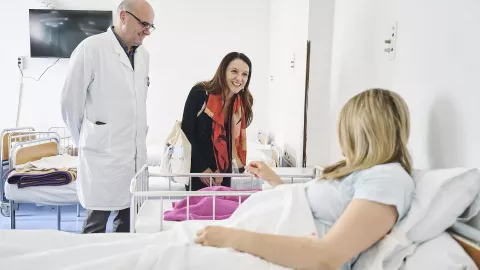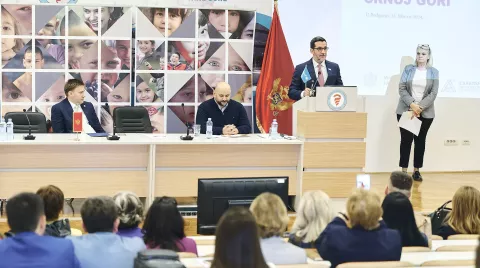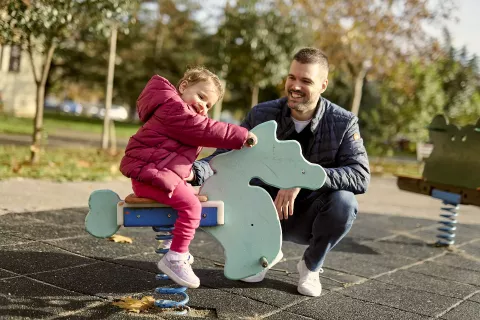Parenting schools for active fathers
Thanks to the parenting programme, children have more active dads

- Available in:
- Crnogorski
- English
- Shqip
Podgorica, 17 February 2022 – Bojan, Ivan, Filip, Marko, Miso, Slobodan, Bojan and Nikola are showing that fathers, just like mothers, want to be involved in the upbringing and development of their children. The eight of them are members of a group of parents of different ages, occupations and parenting experiences. Nevertheless, they are connected by the fact that they have decided to make their relationships with their children and their behaviour better. This was made possible by the “Caring Families” parenting programme, intended for parents of children aged 2–9 years, implemented by the Association “Parents” with the support of UNICEF and the financial support of the EU. The three of them attended the programme in late 2021.
The programme itself promotes the establishing of positive relationships between parents and children, spending quality time together and conversing about feelings. In addition, parents learn how to set boundaries and how to act when their child misbehaves.
“I would often shout and be verbally aggressive towards my daughter when communicating with her, and I realized that this was not doing any good to our relationship,” Slobodan Volaric, a father of two, says.
He has noticed a change in his own behaviour during the 12 weeks of group work and counselling that supports parents to find solutions to their problems on their own.
I notice that I have stopped saying “no” so often and that I am using different methods to explain to my daughter when she is not allowed to do something. I try to make it sound affirmative, and not energetic and prohibiting.

Marko Cacic, a father of two, adds that he started applying the methods he learned during the programme both consciously and unconsciously.
“Now, I react differently to situations that were seriously undermining my relationship with my daughter. Now I think about what has happened or what caused it to happen in the first place.”
Although it is not common for fathers to participate in large numbers in parenting programmes, these programme participants believe that attending them is extremely important.

This programme is more than necessary and effective for future generations.
Father of a three-year-old boy, Ivan Canovic, believes that both fathers and mothers should participate in parenting programmes.
The father should be involved and play his role.

The participants of the programme emphasize that they were given the opportunity to speak openly, to exchange their experiences and to hear the opinion of participants with longer parenting experience, in addition to experts’ opinions.
The “Caring Families” programme has been implemented in Montenegro since 2018.
Darija Petovic Bambur, a psychotherapist and one of the programme facilitators, says that they have had mixed groups but they decided to form a group comprised only of fathers in late 2021.

“We wanted to normalize the fact that the father has an important and irreplaceable role in his child’s growing up and to show how important it is to have fathers assume the role that belongs to them.”
“Caring Families” is part of a suite of parenting programmes whose objective is to foster positive relationships between children and parents in low-resource contexts. It was developed in collaboration between the World Health Organization, Stellenbosch and Cape Town Universities in South Africa, Oxford and Bangor Universities in the UK, and UNICEF.




